How DBT is helping me manage my mental health conditions
While she felt confused by her mental health conditions at the beginning, Rebecca says they are now helping her piece her mind together.

TW: This piece mentions eating disorders, please take care while reading.
Living with multiple mental health conditions can be exhausting to say the least. While everyone’s experience is different, here is what I have learned in my own mental health journey:
- Acceptance is key
- A diagnosis is not a life sentence
It all started on my fifteenth birthday with a trip to the school chaplain and here I am eight years later with a handful of disorders. It was the first diagnosis, Asperger’s, that I struggled to accept the most due to the fact that it wasn’t technically a ‘mental health condition’ which is what I had been expecting. Asperger’s is a form of autism typically diagnosed in boys, and as children, whereas I was a teenage girl – a suddenly very confused teenage girl. When the psychologist told my parents and me, I looked at them. They didn’t seem to be as confused as me, which confused me even more.
‘But you don’t LOOK autistic’
They now say that this was the moment it all made sense to them (it all being, well me.) I assumed I was going to be told that I had anxiety or depression because what else could it be? I had never heard of Asperger’s before except for Sheldon from The Big Bang Theory. I stormed out of the building because I didn’t believe it, they had it all wrong.
Although refusing to accept it myself I was not prepared for the reactions I was about to get from other people. If I was looking for confirmation that the diagnosis was wrong, I got it, from EVERYONE. Most comments were along the lines of ‘but you don’t LOOK autistic.’ It wasn’t long until I became embarrassed to tell anyone at all because I felt like a liar or a fraud and so began my heavy reliance on the validation of others.
Not fitting stereotypes
Next, I was diagnosed with obsessive compulsive disorder which made a lot more sense to me. Despite this, people still felt entitled to tell me that I don’t have OCD because I don’t wash my hands more often than the average person or keep my room extra tidy.
Seeing as my obsessive compulsions didn’t fit the criteria of the stereotype, it couldn’t be true. Not leaving the house because my socks didn’t match the buttons on my cardigan wasn’t enough. Neither was missing the Paramore concert I was so excited for until the night before when I cancelled because my nail polish wasn’t perfect so I stayed home with socks on my hands so I didn’t have to look at them. Or the amount of pages I ripped out of my journal because the crosses on the t’s weren’t straight, and the tails on the y’s weren’t the same length as the tails on the g’s.
Self-doubt became as much a part of my life as the disorders I was diagnosed with. Another that I found hard to accept was having an eating disorder, which has controlled the majority of my life. As with OCD, it wasn’t exactly that I didn’t believe it myself, but the fear of whether other people would. In my mind, I wasn’t underweight so I couldn’t have an eating disorder. While that is not factual, I would recall all the times I was told that I don’t LOOK autistic and couldn’t help but think well I don’t LOOK like I have an eating disorder.
Accepting my truth
The truth is that all along I was looking for acceptance in the wrong place. My first mistake was not taking into consideration the fact that people will always have an opinion. My second mistake was underestimating the fact that to me, their opinions meant everything. No matter how many people told me they believed that I have Asperger’s, OCD, or an eating disorder, I would always prioritise the opinions of the ones who didn’t. It’s not just acceptance that is key, it’s self-acceptance. If we let the doubt of others influence our preexisting doubt, we will never accept ourselves for who we are without question.
Television shaped my understanding
Mental health is complex and to no fault of their own many people are ignorant to the reality of it, meaning that a lot of their opinions are based on myths and misconceptions. I was ignorant myself back when I believed that I couldn’t be autistic based purely on the knowledge I had gathered from an exaggerated stereotype on television.
Positively Disordered
With some diagnoses come confusion, but with others, clarity. A diagnosis I had no trouble accepting was borderline personality disorder (also known as emotional dysregulation disorder). As with my parents when I was diagnosed with Asperger’s, this was the moment it all made sense to me. I resonated with the symptoms so much so that I didn’t even question what anyone else thought.
I started DBT (dialectical behavioural therapy) which is specifically designed to treat emotional instability (the psychological term for this is emotional dysregulation), a core trait of borderline personality disorder.
Those experiencing emotional instability may experience some of these intense negative emotions:
- rage
- sorrow
- shame
- panic
- terror
- long-term feelings of emptiness and loneliness
DBT helped me accept my multiple conditions
DBT teaches four major skills to manage intense emotions, including mindfulness, distress tolerance, interpersonal effectiveness, and emotion regulation. With mindfulness, I learned to live in the moment, rather than overthink about the past or future. Now I can eat an ice cream and enjoy it rather than let it affect what I eat for the rest of the day.
Distress tolerance taught me to distract myself so that now when I notice obsessive compulsive behaviours, like repeatedly writing the same sentence, I can leave it be and try again later. Interpersonal effectiveness gave me the confidence to assert myself and ask for help when I need it, and emotional regulation helps me to identify my emotions and to challenge the negative ones.
I did DBT in a group setting, which I think is what helped the most. Hearing others speak about feelings similar to mine encouraged an understanding, and more importantly, an acceptance that what I was going through was normal. I can say without a doubt that sharing our experiences played an important role in learning and developing our skills.
Pieces of the puzzle
While it can be easy to see a diagnosis as a life sentence, especially after receiving multiple, I now see each one like a clue revealing another piece of the puzzle that is my mind. If I was never diagnosed with borderline personality disorder, I never would have started DBT. If I never started DBT, who knows what, if any, progress I would have made by now or whether I’d be able to say that I no longer rely on the validation of others.
Feeling overwhelmed and want to talk to someone?
- Get anonymous support 24/7 with our text message support service
- Connect with a trained volunteer who will listen to you, and help you to move forward feeling better
- Whatsapp us now or free-text SPUNOUT to 50808 to begin.
- Find out more about our text message support service
If you are a customer of the 48 or An Post network or cannot get through using the ‘50808’ short code please text HELLO to 086 1800 280 (standard message rates may apply). Some smaller networks do not support short codes like ‘50808’.
Need more information, advice or guidance?
We offer information, advice and guidance about the issues that matter to you. Our online Youth Information Chat service is for 16 to 25 year olds and is available Monday to Friday, 4pm to 8pm (excluding Bank Holidays).
- Chat now to a trained Youth Information Officer
- Or leave us a message and we will email you back





